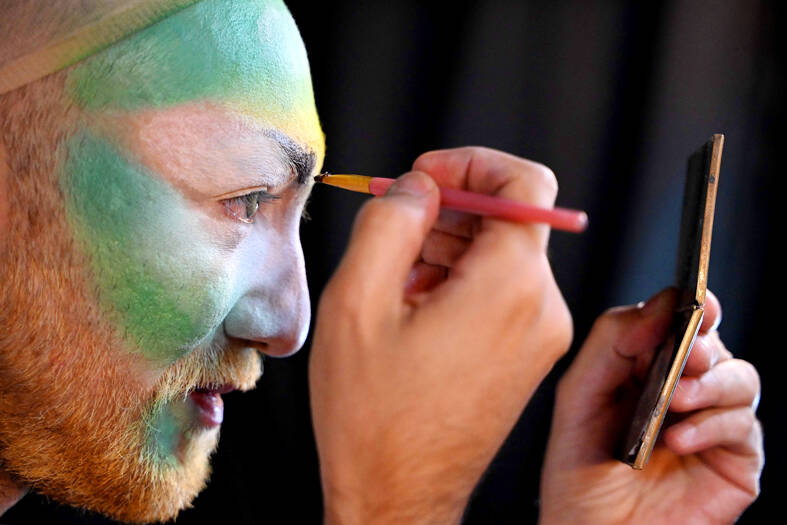When Filipino drag queen Amadeus Fernando Pagente dressed up as Jesus Christ and sang the Lord’s Prayer in a Manila show, he considered it an expression of his Catholic faith. But then a video of the performance went viral in July last year and ignited outrage among the country’s many devout, who saw it as a blasphemous act deserving of jail or even death.
Pagente was charged with the offence of “immoral doctrines, obscene publications and exhibitions and indecent shows” that “offend any race or religion,” and could face up to 12 years in jail.
The 33-year-old, who uses he, she and they pronouns, was declared persona non grata in multiple cities and was flooded with hate messages and death threats on social media.

Photo: AFP
While the Philippines has a reputation for being LGBTQ-friendly, it remains a conservative country where nearly 80 percent of people are Catholic.
Same-sex marriage, abortion and divorce are banned, and advocates have been fighting for decades for a nationwide law to protect LGBTQ people from discrimination.
Pagente, who describes himself as pansexual, gender fluid and a devout Catholic, said the reaction to his show left him shaken, but not surprised.

Photo: AFP
He said hatred towards LGBTQ people “has always been there,” but his performance gave critics “an excuse to express it.”
Pagente said he chose to perform the Lord’s Prayer to “reignite” a sense of faith among LGBTQ people who have felt shunned by the Church.
For many Filipinos, however, his portrayal of Jesus singing the religious prayer in a drag show was offensive.

Photo: AFP
Two Christian groups are among those that filed seven criminal complaints against Pagente.
RELIGION AND QUEERNESS
Harry Serrano of the LGBTQ advocacy group UP Babaylan said the backlash was about Pagente’s sexuality.
“We have seen instances where straight people imitate religious figures and they don’t get flak for it. But because PLV is queer, they are getting hate,” she said, using the initials for Pagente’s drag name, Pura Luka Vega.
“We see religion and queerness as something that’s separate in the Philippines. It’s either you’re queer or you’re religious.”
Since taking office in 2013, Pope Francis has repeatedly said the Church should be open to everyone, including LGBTQ believers.
But Francis has also made clear that he believes homosexuality is a sin, while Church doctrine states same-sex acts are “intrinsically disordered.”
Father Jerome Secillano of the Catholic Bishops’ Conference of the Philippines said the Church criticized Pagente’s performance because it was “disrespectful” of the faith.
“I have no problem with him being gay, I have no problem with whatever his queerness is,” Secillano said.
LGBTQ people are welcome in the Church, Secillano said, but “you must be willing to change for God because God will not change for you.”
DAILY DISCRIMINATION
Carlos Conde of Human Rights Watch said the Catholic Church in the Philippines was “pretty liberal” compared to other countries.
But he said if LGBTQ people felt they could not freely express themselves without fear of being harmed or threatened, “then I think we have a problem.”
Conde said laws protecting religious feelings should be reviewed to ensure they were not “harming freedom of expression.”
In recent decades, the LGBTQ community has become increasingly visible in public and on television in the Philippines.
Annual Gay Pride marches draw thousands of people, and LGBTQ groups are found across the country and on social media. But Serrano said the LGBTQ community still “faced discrimination on a daily basis.”
A survey conducted by local pollster Social Weather Stations early last year showed mixed views.
It found 79 percent of respondents agreed that “gays or lesbians are just as trustworthy as any other Filipino,” while 73 percent said they have contributed a lot to society.
But 40 percent said they would like their gay or lesbian family members to become straight and 26 percent thought being gay or lesbian was “contagious.”
Senator Risa Hontiveros, who has championed LGBTQ rights, described Pagente’s performance as “regrettable.”
Last year, she urged people not to use the incident “to deny rights and protections to a community that has long been marginalized and excluded.”
Hontiveros is sponsoring a bill that would prohibit discrimination on the basis of sexual orientation and gender identity, which progressive members of congress have been trying to get approved for more than 20 years.
It has faced stiff opposition from conservative lawmakers and religious leaders, who claim it would be a stepping stone to same-sex marriage and would infringe on the rights of the Catholic Church and schools. As he fights to stay out of jail, Pagente continues to perform in drag shows and remains defiant about dressing up as Jesus.
“You can’t tell me what I can and cannot do in terms of expressing my faith or how I express my queerness,” he said. “No one has an exclusive ownership of the concept of Jesus.”

June 23 to June 29 After capturing the walled city of Hsinchu on June 22, 1895, the Japanese hoped to quickly push south and seize control of Taiwan’s entire west coast — but their advance was stalled for more than a month. Not only did local Hakka fighters continue to cause them headaches, resistance forces even attempted to retake the city three times. “We had planned to occupy Anping (Tainan) and Takao (Kaohsiung) as soon as possible, but ever since we took Hsinchu, nearby bandits proclaiming to be ‘righteous people’ (義民) have been destroying train tracks and electrical cables, and gathering in villages

Dr. Y. Tony Yang, Associate Dean of Health Policy and Population Science at George Washington University, argued last week in a piece for the Taipei Times about former president Ma Ying-jeou (馬英九) leading a student delegation to the People’s Republic of China (PRC) that, “The real question is not whether Ma’s visit helps or hurts Taiwan — it is why Taiwan lacks a sophisticated, multi-track approach to one of the most complex geopolitical relationships in the world” (“Ma’s Visit, DPP’s Blind Spot,” June 18, page 8). Yang contends that the Democratic Progressive Party (DPP) has a blind spot: “By treating any

This year will go down in the history books. Taiwan faces enormous turmoil and uncertainty in the coming months. Which political parties are in a good position to handle big changes? All of the main parties are beset with challenges. Taking stock, this column examined the Taiwan People’s Party (TPP) (“Huang Kuo-chang’s choking the life out of the TPP,” May 28, page 12), the Democratic Progressive Party (DPP) (“Challenges amid choppy waters for the DPP,” June 14, page 12) and the Chinese Nationalist Party (KMT) (“KMT struggles to seize opportunities as ‘interesting times’ loom,” June 20, page 11). Times like these can

Swooping low over the banks of a Nile River tributary, an aid flight run by retired American military officers released a stream of food-stuffed sacks over a town emptied by fighting in South Sudan, a country wracked by conflict. Last week’s air drop was the latest in a controversial development — private contracting firms led by former US intelligence officers and military veterans delivering aid to some of the world’s deadliest conflict zones, in operations organized with governments that are combatants in the conflicts. The moves are roiling the global aid community, which warns of a more militarized, politicized and profit-seeking trend